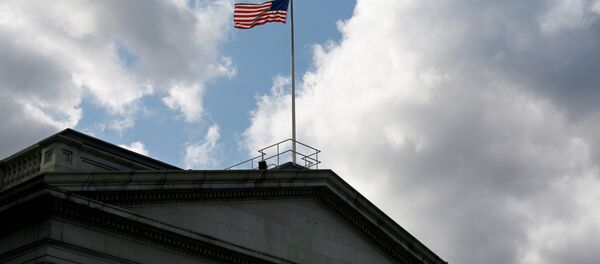"There has already been a material contraction in trade between Russia and the US over recent years and the Russian government has minimal reliance on external bank financing. As a consequence, the credit impact of the newly imposed sanctions on Russian government funding or the broader Russian economy is likely to be relatively contained unless they were to cause a significant erosion in investor confidence," the Moody's said.
READ MORE: Fitch: Russia 'Copes Well' With New US Sanctions, Economy Resilient to Shocks
Potential US sanctions against Russian state-owned banks are unlikely to cause a system-wide banking crisis in the country, the Moody's Investors Service said in an issuer comment on Monday.
"The menu of potential second round sanctions being discussed in Washington is wide, ranging from a US veto on multilateral lending, a prohibition on lending by US banks, a ban on all non-agricultural exports, further import restrictions, a downgrade or suspension of diplomatic relations and suspensions of US landing rights for Russian national air carriers… "
"In our view, sanctions against mostly deposit-funded state-owned banks would be unlikely to cause a system-wide banking crisis but would impede their ability to provide credit and support growth. Russia’s low reliance on capital-intensive non-conventional oil production limits the potential fallout from lack of US participation in its oil projects," the Moody's said.
"Still, the restrictions mean that Russia will be constrained from developing some of its more difficult to reach resources, which would reduce potential oil and gas output prospects over time," the credit rating agency added.
Moreover, Moody's predicts that the second round of sanctions is unlikely to end up as tough as it is currently being discussed in the US Congress.
"We expect sanctions coming from the administration to be milder than some of those being discussed in the US Congress. The White House has adopted a more conciliatory tone towards Russia than was the case under the 1991 law; given that the president [Donald Trump] has full discretion on the scope and nature of the sanctions applied in the second round as opposed to the first, it is possible that the US administration would choose to avoid the more punitive options in the second round," the rating agency underlined.
READ MORE: 'US Sanctions on Russia May Backfire and Hurt Global Economy' — Market Analyst
The new US sanctions against Russia came into force at 7 a.m. Moscow (04:00 GMT) on Monday.
The restrictive measures, which were first announced in early August, will terminate US arms sales to Russia, prohibit exports of national security-sensitive goods and technology, deny any kind of US government's financial assistance to Russia, and end all support to Moscow under the Foreign Assistance Act of 1961, expect for any urgent humanitarian aid.
Earlier on Monday, the Russian Foreign Ministry said that the new sanctions could not force Russia to give up on its decision to defend its national interests, although the restrictive measures hindered the US-Russian dialogue both in bilateral and multilateral formats.
Russia has repeatedly denied involvement in the case, stressing that London has neither provided evidence nor cooperated with Moscow in investigating the incident as required under international law.




